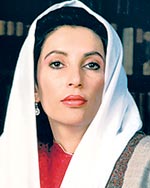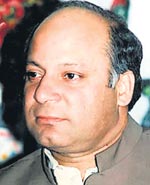
Putting cart before the horse: Deals that Pakistani politicians makeThere is a saying in Punjabi: Pind vasay nahin shareek phela e aagaye (villages have not yet taken roots but the claimants have come first). The proverb came to my mind when I read that Benazir Bhutto and Nawaz Sharif were disputing who should be the prime minister first. The dispute is unfortunate. Even a small tiff between them can cast a shadow on their joint resolve to re-establish in Pakistan democracy, sans military. Only last year did they show solidarity and signed together the Charter of Democracy. They declared that "only the people and no one else have the sovereign right to govern through their elected representatives."
The question who should be the prime minister can arise only after elections when the Pakistanis get back their democratic right to rule themselves. Sharif's spokesman has a point when he says: It is for the people of Pakistan to decide who will govern after free and fair elections. True, this is what democracy demands. Yet, the fact remains that Sharif offered prime ministership to Benazir if and when elections were held in Pakistan. When I interviewed Sharif at Jeddah a couple of years ago, he told me that he rang Benazir to request her to be the prime minister first. "I am young and have all the time to wait," were his exact words. Checking with Benazir in Dubai a few months later, I found that he had telephoned her to make the offer: "You become prime minister first." Both live outside Pakistan since the advent of President General Pervez Musharraf's rule and cannot return without his consent. Both have wide support in Pakistan, Benazir leading the largest Pakistan People's Party (PPP) and Sharif the Muslim League, part of which has been gobbled up by Musharraf. Both have had ups and downs in popularity but their relevance to Pakistan's polity has seldom been questioned. Were they to come back even today, they would sweep the polls, provided elections were free and fair. Benazir looks like winning in Sind and Sharif in Punjab. The NWFP and Baluchistan may go mainly to the combination of religious parties, Benazir claiming some seats. In the conditions obtaining in Pakistan, it is futile to debate who would be the next prime minister. So many important matters remain to be settled yet. The first and the foremost is whether Musharraf would give up his uniform before holding elections and whether the intelligence agencies and the military would hold free and fair elections. Yet, if the election machinery stays as it is there is no way that Pakistan can have free and fair polls. The entire set-up is reeking of such people who have perfected the art of manipulating elections, from the preparation of bogus electoral rolls to the declaration of unelected candidates elected. Things can be retrieved if the Election Commission is reconstituted to include one lawyer and one NGO enjoying credibility. Foreign observers can never detect the finesse with which the army and the intelligence agencies manage the polls. The return of Benazir may make some difference because her effort would be to ensure the sanctity of the ballot box. However, it looks as if Benazir is in the midst of a settlement with Musharraf on power sharing. He may not have to drop the uniform straightaway but would do so subsequently. It is possible that America has brokered the deal because it wants both of them, Benazir and Musharraf, "liberal political forces," to jointly run the affairs of Pakistan. How cold-blooded is Washington in its calculation to tow democracy and dictatorship together! On the other hand, the long wilderness has convinced Benazir that she cannot return to power without a deal with Musharraf. True, his image is damaged beyond repair. The lawyers' agitation has cut into his standing in the class which, although unhappy, did not revolt against him. What helps Musharraf is that political parties have practically kept away from the agitation. They are supportive of it. But they have not shoved their cadre into fire. For this, Benazir has to be blamed. Political parties are not sure how she, the key person, would play her cards. Whenever there is a move to get all parties on a single platform to support the lawyers' agitation, the PPP has dragged its feet. Probably, Benazir believes that by doing so, she may make Musharraf's exit certain but not her prime ministership. What she is not reckoning is the damage she is doing to her party. Once people see her joining hands with Musharraf, her popularity may take a nosedive. An Army-PPP tie-up may be formidable but it will ruin the reputation of the PPP which is still considered an anti-establishment force. There may well be a revolt in her party. Leading lights like Aitzaz Hassan and Choudhary Manzur may quit the PPP and constitute a new progressive alliance. After having fought Musharraf's military rule relentlessly, they will lose their credibility once they are seen compromising with the Mushrraf forces. Still, Sharif would be ill-advised if he were to go to town to denounce the Benazir-Musharraf settlement. However indigestible, this could be the way to break the logjam, particularly when Musharraf continues to be the darling of the West. Sharif should not underestimate the strength of the jehadis and fundamentalists who are gaining ground in Pakistan. The restoration of democracy, even though not fully, will weaken extremists. It is an open secret that a substantial number of radicals are in the armed forces with the Jamat-e-Islami supporting them. Sharif who is totally against any deal with the military must be disappointed with Benazir. But he should study how Mahatma Gandhi waged the struggle against the British and how he made up with them even when he had an upper hand. He knew the conditions were not ripe for a change and people were not fully committed to it. The lawyers' agitation, however successful, has got into a pattern. The establishment allows the "sacked" chief justice receptions which are undoubtedly getting bigger and bigger. The lawyers on their part do not have the influence or clout to bring masses to the streets. Musharraf still does not like what is happening. But he cannot help. What is worrying him - and America - is that fundamentalists are increasing their hold. At one time I thought Musharraf would go but not the fauj (army). Now it looks as if both are staying for the time being with, of course, reduced powers. It cannot be helped because Benazir wants to return soon. She is worried over Pakistan going the wrong way unless the people's exasperation with the military is politically directed. She may be right. |
||||
|| Front
Page | News | Editorial | Columns | Sports | Plus | Financial
Times | International | Mirror | TV
Times | Funday
Times || |
| |
Copyright
2007 Wijeya
Newspapers Ltd.Colombo. Sri Lanka. |

